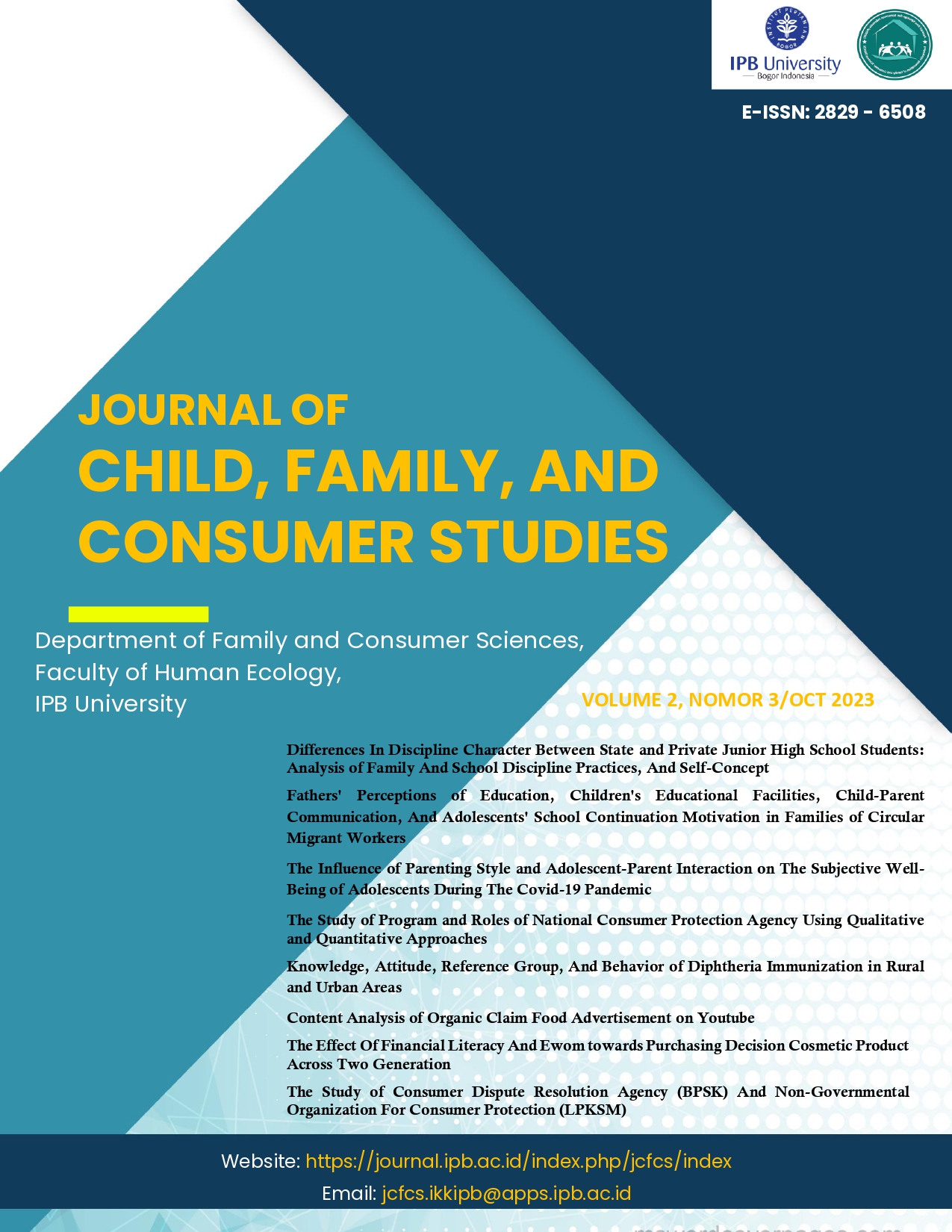DIFFERENCES IN DISCIPLINE CHARACTER BETWEEN STATE AND PRIVATE JUNIOR HIGH SCHOOL STUDENTS: ANALYSIS OF FAMILY AND SCHOOL DISCIPLINE PRACTICES, AND SELF-CONCEPT
Abstract
Disciplinary practices are instilled through routine activities as an effort to build adolescent habits, educated to behave well, and respect others. Disciplinary character can be applied well as a result of the formation of an optimal self-concept that is able to have a positive influence on discipline. The purpose of this study is to analyze the influence of family and school discipline practices, as well as self-concept on the disciplinary character of junior high school students. This study used a cross-sectional study design and purposive sampling technique with a total of 150 respondents who were students from public junior high schools, private junior high schools, and private religious-based junior high schools living at home with parents/other family members. The results of this study found that family discipline practices were in the high category, school discipline practices and discipline character were in the medium category, while self-concept was in the low category. The result of the T-test shows that state school students have a better disciplinary character than private and religious-based school students. PLS analysis shows that family and school discipline practices have a direct effect on self-concept and no direct effect on discipline character. The results of path analysis show that there is a significant influence of family and school discipline practices through self-concept on the disciplinary character of junior high school students.
References
Aini, H., & Haq, M. S. (2020). Implementasi kurikulum Cikal 5 Stars Comptencies dalam meningkatkan kompetensi peserta didik SMP Cikal Surabaya. Jurnal Inspirasi Manajemen Pendidikan, 8(3), 187–198.
Anisa, R., & Jerusalem, M. A. (2019). Program petugas kedisiplinan kelas inovasi penanaman karakter disiplin di Sekolah Dasar. Jurnal Pendidikan Edutama, 6(2), 77–86. https://doi.org/10.30734/jpe.v6i2.319
Aprianti, W., Muslihin, H. Y., & Elan. (2021). Applying discipline character : Parents vs . teachers. Journal of Early Childhood Care and Education, 4(1), 24–34. https://doi.org/10.26555/jecce.v4vi1i.4004
Ardi, M. (2012). Pengaruh pemberian hukuman terhadap disiplin siswa dalam belajar. Jurnal Eksos, 8(1), 61–72. http://repository.polnep.ac.id/xmlui/handle/123456789/359
Ariyanti, L. F. (2020). Strategi orang tua millenial dalam menanamkan kesadaran menjalankan shalat lima waktu. Jurnal Ilmu Pendidikan (JIP), 1(2), 80–91.
[BPS] Badan Pusat Statistik. 2021. Jumlah sekolah, guru, dan murid sekolah menengah pertama (SMP) di Bawah Kementerian Pendidikan, Kebudayaan, Riset, dan Teknologi Menurut Provinsi, 2021/2022 [internet]. [diacu 2022 Mar 22]. Terdapat dari: https://www.bps.go.id/indikator/indikator/view_data_pub/0000/api_pub/dzdoVmp3YWdGNU0yWEgraVIwbmRqZz09/da_04/1
Crase, S. J., Foss, C. J., & Colbert, K. K. (1981). Children “s self-concept and perception of parents” behavior. The Journal of Psychology, 108(2), 297–303. https://doi.org/10.1080/00223980.1981.9915278
Darwianis, & Nursi, M. (2020). Pengaruh konsep diri, lingkungan keluarga dan pendidikan orang tua terhadap disiplin siswa SMP Negeri di Kecamatan Nanggalo Kota Padang. Jurnal PPKN & Hukum, 15(1), 47–59.
Elom, S. N. S., & Adi, P. (2019). Peran orang tua dalam menanamkan kedisiplinan anak. Prosiding Seminar Nasional Pendidikan Dan Pembelajaran Bagi Guru Dan Dosen, 3, 220–227. file:///C:/Users/ACER/Downloads/218-Article Text-364-1-10-20191214.pdf
Fiana, F. J., Daharnis, & Ridha, M. (2013). Disiplin siswa di sekolah dan implikasinya dalam pelayanan bimbingan dan konseling. KONSELOR | Jurnal Ilmiah Konseling, 2(23), 26–33. https://doi.org/https://doi.org/10.24036/02013231733-0-00
Guntur, N. A., Kasmawati, A., & Sudirman, M. (2018). Peran orang tua dalam menanamkan sikap disiplin anak di Desa Kalimporo Kecamatan Bangkala Kabupaten Jeneponto. Jurnal Pemikiran, Penelitian Hukum, Pendidikan Pancasila Dan Kewarganegaraan, 5(1), 143–154.
Halimah, N., Robiansyah, F., & Darmawan. (2021). Implementasi amalan yaumiyyah dalam pembinaan karakter disiplin: studi kasus di SDIT Al-Zahira Kota Serang. Al-Tarbawi Al-Haditsah: Jurnal Pendidikan Islam, 6(2), 129–153. https://doi.org/10.24235/tarbawi.v6i2.8882
Hastuti, D. (2015). Pengasuhan: Teori, Prinsip, dan Aplikasinya di Indonesia. Bogor (ID): IPB Press
Hikmah, M., Kadar, & Risnawati. (2021). Pengaruh lingkungan keluarga dan pelaksanaan tata tertib sekolah terhadap kedisiplinan belajar siswa di SMP Se Kecamatan Batang Gansal Indragiri Hulu. Instructional Development Journal (IDJ), 4(2), 119–129. https://doi.org/10.24014/idj.v4i1.12381
Hunter, W. M., Jain, D., Sadowski, L. S., & Sanhueza, A. I. (2000). Risk factors for severe child discipline practices in rural India. Journal of Pediatric Psychology, 25(6), 435–447. https://doi.org/10.1093/jpepsy/25.6.435
Jailani, M. S. (2014). Teori pendidikan keluarga dan tanggung jawab orang tua dalam pendidikan anak usia dini. Nadwa: Jurnal Pendidikan Islam, 8(2), 245–260. https://doi.org/10.21580/nw.2014.8.2.580
Kusumawardana, A. S. (2018). Differences of discipline level between students from state and private Junior High School in Malang City. Proceedings of the University of Muhammadiyah Malang’s 1st International Conference of Mathematics Education (INCOMED 2017), 160, 280–283. https://doi.org/10.2991/incomed-17.2018.59
Mahrani, N., Ritonga, A., Hasibuan, M. K., & Harahap, S. E. (2020). Analisis sisi negatif moralitas siswa pada masa pembelajaran jarak jauh. THORIQOTUNA: Jurnal Pendidikan Islam, 3(1), 56–63. https://doi.org/https://doi.org/10.47971/tjpi.v3i1.227
Monks, F. J., Knoers, A. M. P., Haditono, S. R. (2006). Psikologi Perkembangan: Pengantar dalam Berbagai Bagiannya. Yogyakarta (ID) : Gadjah Mada University Press.
Munawaroh, M. L., Alhadi, S., & Saputra, W. (2017). Tingkat prokrastinasi akademik siswa Sekolah Menengah Pertama Muhammadiyah 9 Yogyakarta. Jurnal Kajian Bimbingan Dan Konseling, 2(1), 26–31. https://doi.org/10.17977/um001v2i12017p026
Muslih, M., & Rosyidah, R. (2020). Statistika: Aplikasi di Dunia Kesehatan. UMSIDE Press.
Paramitha, S. D. (2018). Peran ibu pekerja dalam mendidik anak. Jurnal Kajian Gender Dan Anak, 2(1), 147–170.
Polpoke, S. M., Nursaid, & Nurhasanah. (2019). Implementasi program full day school dalam peningkatan kedisiplinan peserta didik di SMP Islam Terpadu (IT) As-Salam Ambon. Kuttab: Jurnal Ilmiah Mahasiswa, 1(1), 14. https://doi.org/10.33477/kjim.v1i1.881
Purwaningsih, S. S., Qodratullah, W., & Junaedi, N. (2019). The contribution of state defense and discipline programs to student discipline character in Politeknik Negeri Bandung. PGSD UNIMED: Jurnal Handayani, 10(2), 17–21. https://doi.org/https://doi.org/10.24114/jh.v10i2.16044
Putnick, D. L., Bornstein, M. H., Hendricks, C., Painter, K. M., Suwalsky, J. T. D., & Collins, W. A. (2008). Parenting stress, perceived parenting behaviors, and adolescent self-concept in European American families. Journal of Family Psychology, 22(5), 752–762. https://doi.org/10.1037/a0013177
Rogers, C. R. (1954). Psycho-therapy and Personality Change. Chicago (US): University of Chicago Press.
Rosa, E. M., & Tudge, J. (2013). Urie Bronfenbrenner’s Theory of human development: Its evolution from ecology to bioecology. Journal of Family Theory & Review, 5(6), 243–258. https://doi.org/10.1111/jftr.12022
Roshita, I. (2014). Meningkatkan Kedisiplinan Siswa Melalui Layanan Bimbingan Kelompok Dengan Teknik Modeling. Jurnal Penelitian Tindakan Kelas, 16(2), 46–51.
Rustam, H. K., & Tentama, F. (2020). Creating academic stress scale and the application for students: Validity and reliability test in psychometrics. International Journal of Scientific and Technology Research, 9(1), 661–667.
Sagulu, K. Y. (2017). Pengaruh disiplin belajar dan lingkungan keluarga terhadap hasil belajar siswa kelas XI Mata Pelajaran Ekonomi SMAN 1 Kasihan Bantul Tahun Ajaran 2016/2017 (Skripsi). Universitas Islam Negri Yogyakarta.
Saputra, E., Suntoro, I., & Adha, M. M. (2014). Pengaruh penguasaan konsep diri dan penegakan peraturan terhadap tingkat kedisiplinan. Jurnal Kultur Demokrasi, 2(8), 1–14.
Sedyawati. (2021). Hubungan regulasi diri dengan prokrastinasi akademik. Jurnal Pembelajaran, Bimbingan, Dan Pengelolaan Pendidikan, 1(10), 861–866. https://doi.org/10.17977/um065v1i102021p861-866
Sholichah, A. S., Alwi, W., & Fajri, A. (2020). Implementasi metode keteladanan dalam meningkatkan mutu pendidikan akhlak pada mata pelajaran Pendidikan Agama Islam: Studi kasus di SMP Islam An-Nasiriin Jakarta Barat. IQ (Ilmu Al-Qur’an): Jurnal Pendidikan Islam, 3(2), 163–182. https://doi.org/10.37542/iq.v3i02.130
Simanungkalit, D. (2017). Upaya meningkatkan kedisiplinan siswa melalui layanan penguasaan konten dengan teknik modelling pada siswa kelas VII SMP Negeri 8 Tebing Tinggi. School Education Journal Pgsd Fip Unimed, 7(1), 74–81. https://doi.org/10.24114/sejpgsd.v7i1.6839
Susanti, R., & Ihromi, I. (2021). Peran ibu rumah tangga dalam menanamkan nilai-nilai islami kepada anak saat belajar dari di rumah pada masa pandemi COVID 19. “Islam and Sountheast Asian Communities Welfare in the COVID-19 ERA,” 337–354.










